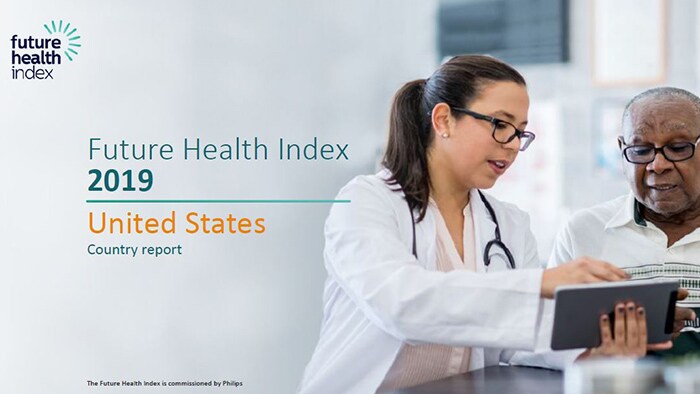Jul 18, 2019
Philips Future Health Index 2019 finds US among leaders in EMR use and AI spend, but overall digital health technology adoption mixed
Investment, benefit and opportunity high but misconceptions and interoperability challenge scaling of AI and telehealth; millennials reluctant to share digital data
Andover, MA – Royal Philips (NYSE: PHG, AEX: PHIA), a global leader in health technology, today announced its U.S. Future Health Index (FHI) 2019 report, showing that while American healthcare professionals are among the leaders in leveraging digital health records1 (DHRs), the United States falls behind the 15-country average for most other digital technologies examined. Digital health technologies have the potential to reduce healthcare professional workload, curb healthcare professional burnout and enhance their satisfaction, yet many American healthcare professionals are not harnessing the full potential and support of digital health technology in all aspects of their work. The report showed that the use of telehealth and artificial intelligence (AI) are among the largest opportunities for improvement of quality and cost savings in healthcare. While 84% of healthcare professionals in the U.S. are using DHRs (e.g. Electronic Medical Records or Electronic Health Records), only 46% of U.S. healthcare professionals use telehealth, compared to the 15-country average of 61% and only about 33% use AI-powered solutions in their practice or hospital. Countries like Germany (41%) and China (85%) surpass the U.S. in the use of AI technologies among healthcare professionals, despite the fact that the U.S. has one of the highest spends of AI in healthcare for preliminary diagnosis per capita at $0.06, while China’s spend is $0.002 per capita and Germany’s is $0.03 per capita2. American healthcare professionals cited a lack of interoperability (52%) between record systems as a reason why they do not share health records among their peers inside their healthcare facility, and 57% cited a lack of access to these systems.
The Doc is in but you are not ready to see each other
The report also revealed that many American individuals (58%) have not seen a healthcare professional when they had a medical reason to do so – often due to lack of time, difficulty in scheduling an appointment and availability of a specialist or care provider in their area. The adoption of telehealth technologies could help mitigate these issues as a quarter (25%) of American individuals have already reported that being able to consult with their doctor remotely for follow-up appointments through video or voice calls has improved their experience of healthcare in the last five years.
Although technologies that can improve access to care and patient outcomes are available today in the U.S., both healthcare professionals and individuals need support to fully leverage technology and more seamlessly integrate it to improve the healthcare experience.
Vitor Rocha
CEO of Philips North America
Despite increasing affordability and availability, wide-scale adoption of digital health technologies in the U.S. still faces barriers – resulting in delays to improving access, cost and availability of healthcare and satisfaction for both healthcare professionals and individuals. The adoption and use of telehealth and AI is critical to improving these areas. Telehealth can help tackle access and availability to care challenges, while AI can help improve the quality of care provided through more accurate diagnosis and treatment. However, the report shows misconceptions:
A study by Accenture (2017), notes, “key clinical health AI applications can potentially create $150 billion in annual savings for the United States healthcare economy by 2026.”3 This highlights the need to educate healthcare professionals and individuals on how AI and digital health technology can improve overall healthcare experiences and lower costs. “The Future Health Index 2019 highlights that although technologies that can improve access to care and patient outcomes are available today in the U.S., both healthcare professionals and individuals need support to fully leverage technology and more seamlessly integrate it to improve the healthcare experience,” said Vitor Rocha, CEO of Philips North America. “Through intense collaboration and co-creation of solutions, we can help healthcare professionals and patients benefit, drive adoption rates and deliver on the Quadruple Aim in healthcare: better outcomes, improved patient and staff experience and lower costs.”
Digital natives guard their data
In 2017, the Future Health Index showed that nine-in-ten (91%) U.S. individuals would rather be healthy than rich, if given the choice. Two years later, that number has decreased to 78% who report they would actually rather be healthy than wealthy or they do not know. While still a majority would choose good health over wealth, the survey indicates increased importance of monetary issues, particularly among millennials, who are more likely to choose money over health (29%) than their other generational counterparts such as baby boomers (15%) and Generation X (22%).
In the United States, behaviors related to digital health technology and its rate of adoption vary from one generation to the next. While about two-thirds (63%) of individuals surveyed track health data sometimes/often/always with an application or device, 42% of millennials4 do not feel that this data is important for their healthcare professional to know, and 23% of millennials do not know how to share their data with a healthcare professional. One in five (20%) millennials5 do not want to share their data, on par with Americans overall (18%).
About Future Health Index
The Future Health Index surveys were fielded from March 4 to May 19, 2019 in 15 countries (Australia, Brazil, China, France, Germany, India, Italy, The Netherlands, Russia, Saudi Arabia, Singapore, South Africa, Poland, U.K. and U.S.) in their native language. The survey was conducted online and offline (as relevant to the needs of each market) with a sample size of about 1,000 per market for individuals (general population) and about 200 per market for healthcare professionals. The exceptions were the US and Germany, which each had slightly larger samples of healthcare professionals. For the general population audience, the survey is representative of key demographics e.g. age, gender, region, location type (rural/urban), income/SEL/education and ethnicity (where appropriate to ask). This was achieved through a mix of balancing and weighting. In Saudi Arabia and Brazil, the survey is nationally representative of the online population. The survey length was approximately 15 minutes for the U.S., Germany, and the Netherlands, and approximately 10 minutes for the remaining markets. The total sample from the survey includes 3,044 healthcare professionals (defined as those who work in healthcare as a doctor, surgeon, nurse practitioner, registered nurse, licensed practical nurse or nurse across a variety of specializations) and 15,114 individuals that represent the adult general population.
About Royal Philips
Royal Philips (NYSE: PHG, AEX: PHIA) is a leading health technology company focused on improving people's health and enabling better outcomes across the health continuum from healthy living and prevention, to diagnosis, treatment and home care. Philips leverages advanced technology and deep clinical and consumer insights to deliver integrated solutions. Headquartered in the Netherlands, the company is a leader in diagnostic imaging, image-guided therapy, patient monitoring and health informatics, as well as in consumer health and home care. Philips generated 2018 sales of EUR 18.1 billion and employs approximately 77,000 employees with sales and services in more than 100 countries. News about Philips can be found at www.philips.com/newscenter.
1 Digital health records include Electronic Medical Records (EMRs), Electronic Health Records (EHRs), etc. 2 Allied Market Research. (2016). Healthcare Artificial Market Report. 3 Accenture. (2017). Artificial Intelligence (AI): Healthcare’s New Nervous System. Retrieved from https://www.accenture.com/us-en/insight-artificial-intelligence-healthcare 4 Based on millennials who use digital health technology or mobile apps but have never shared the data with their healthcare professional 5 Based on millennials who have never shared the data with their healthcare professional











